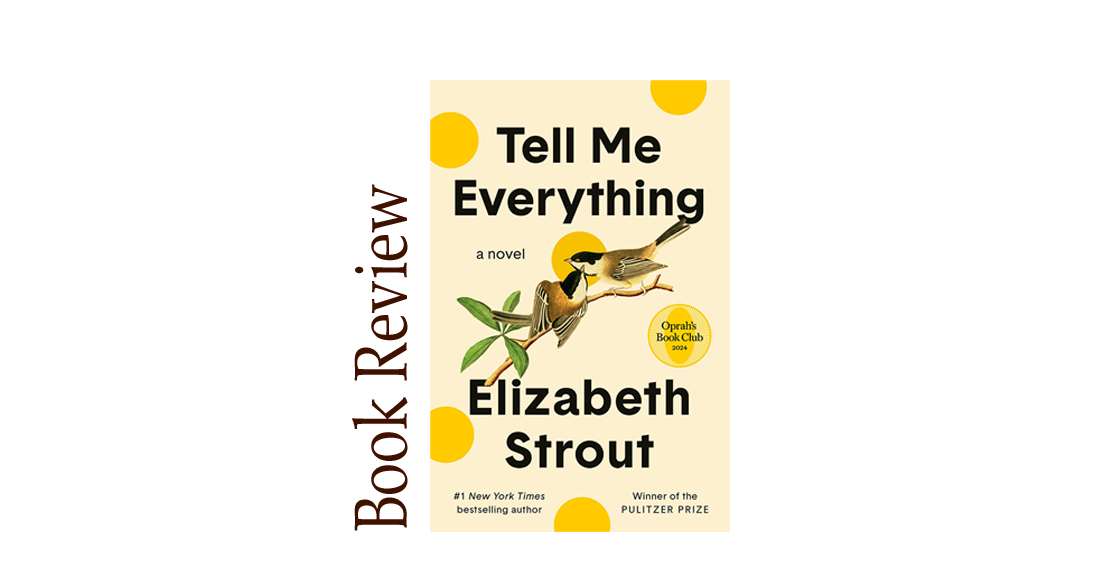- Date Published:
2024 - Length:
352 pages—Listening Time: 10 hrs 59 minutes - Genre:
Fiction - Setting:
2000-Present day, Maine with some scenes in New York - Awards:
BookTube Prize Octofinalist in Fiction 2023; Booklist Editors' Choice Adult Audio 2022; Goodreads Choice Awards Nominee Fiction 2022; The Writers' Prize Shortlist Fiction 2023; NPR: Books We Love 2022; The New York Times Notable Books of the Year Fiction/Poetry 2022; San Francisco Chronicle Best Book of the Year Fiction 2022; LibraryReads Monthly Pick Hall of Fame September 2022 - Language:
English and Latin - Sensitive Aspects:
Loneliness, Aging - Movie:
While the book is available for purchase, there are no current movie adaptations or related deals as of May 2025. - Recommend for Book Club:
Yes, for groups that enjoy real life fiction

I grew up in Carrollton, Texas. It's a big suburb of Dallas now, but when I was growing up, it was still a small town. My childhood neighborhood was home to a group of kids close to my age, all of whom had parents who valued the neighborhood as well as their neighbors. The parents dubbed themselves "The Dingalings," and they all got together for dinners at least once a month. They hosted bridal showers, baby showers, and anniversary parties for anybody in the neighborhood. When someone got sick or was in the hospital, they all rallied together and brought food to that family. Likewise, when anyone in the group had a death in their extended family, the Dingalings were there with food, assistance, and comfort. They loved to drop in on each other and just visit over coffee, because, back then, that's what neighbors who loved their community and each other did. They looked after each other. They cared. It was incredible to grow up with that kind of safety net.
When I started reading Tell Me Everything, even though it is set primarily in Crosby, Maine, I felt like I'd just gone home to Carrollton, Texas, for a neighborhood reunion. The simplicity and honesty that Strout's characters exude speak to the beauty of friendship and community regardless of where it takes place. All the characters were still right where Strout left them at the end of Lucy By the Sea. I felt like I had come home.

Tell Me Everything is Elizabeth Strout’s tenth novel and a poignant reunion of her beloved characters from previous works, including Lucy Barton, Olive Kitteridge, and Bob Burgess. Set in the small coastal town of Crosby, Maine, the novel weaves together themes of loneliness, connection, memory, and the search for meaning in ordinary lives.
The heart of the novel is Bob Burgess, a sixty-five-year-old town lawyer who becomes deeply involved in a murder investigation. Bob is defending Matt Beach, a lonely and socially awkward man accused of killing his own mother—a woman remembered unfavorably by several characters from their childhoods. This case, which runs through the novel, adds a layer of suspense and darkness while also forcing Bob to confront his sense of responsibility and empathy.
Bob’s personal life is equally central. He is married to Margaret, a local minister, but finds deep companionship and solace in his friendship with Lucy Barton, a writer who has moved to Crosby with her ex-husband, William, after leaving New York during the COVID-19 pandemic. Bob and Lucy’s weekly walks along the river become a space for sharing confidence, regrets, and hopes, allowing both to feel truly seen and heard.
Lucy, in turn, is introduced to Olive Kitteridge, now living in a retirement community at age ninety. The two women spend afternoons exchanging stories about the “unrecorded lives” of people they have known—those whose struggles and joys are often overlooked or forgotten. Through these conversations, Strout explores the idea that every life, no matter how seemingly insignificant, holds meaning and deserves to be remembered.

Strout’s narrative delves into the complexities of relationships between siblings, friends, spouses, and parents and their adult children. Bob’s fraught relationship with his brother Jim, his troubled ex-wife Pam, and his role as a “sin eater” who shoulders others’ burdens all contribute to his late-midlife reckoning. Lucy’s own struggles with loneliness and her relationships with her daughters mirror Bob’s journey, and together they contemplate what they want from life and each other.
The novel is also about storytelling itself—sharing memories and listening deeply can bring comfort, understanding, and even redemption. The title, Tell Me Everything, refers to a moment when Lucy urges Bob to share every detail of his life, reflecting Strout’s narrative approach of immersing readers in both the trivial and profound moments that shape her characters’ lives.
Strout’s writing is marked by its empathy, subtlety, and insight into the human condition. The novel's structure allows for multiple perspectives, dipping into the thoughts and emotions of various characters but always returning to Bob as its emotional center. The presence of familiar characters from Strout’s previous books makes this novel especially rewarding for longtime fans like me, though its universal questions about love, loss, aging, and the meaning of life will resonate with new readers as well.

Again, I would highly recommend that you read the first four Lucy Barton books prior to reading Tell Me Everything. You may feel the same angst that I do about reading a book series out of sequence. If so, I also highly recommend reading Olive Kitteridge and Olive, Again before diving into Tell Me Everything.
Here is why this book shines and you should read it:
It is a masterful exploration of ordinary people's lives.
Tell Me Everything is a profound and emotionally resonant novel that continues her tradition of exploring the complexities of everyday life in small-town America. The book centers on Bob Burgess, Lucy Barton, and Olive Kitteridge, beloved characters from Strout’s previous works—bringing them all together for the first time. If you appreciate stories that find depth and meaning in the seemingly mundane, Strout’s narrative style will likely resonate with you.
It amplifies the themes of connection, loneliness, and unrecorded lives.
Strout’s novel delves into the subtle, often unspoken bonds between people. The characters grapple with loneliness, aging, grief, and the longing for connection, all rendered with Strout’s signature compassion and insight. The book’s title reflects a recurring motif: the desire to be truly seen and heard, as Lucy urges, “Tell me everything. And don’t leave anything out.” This approach allows Strout to illuminate the hidden emotional lives of her characters, making their struggles and triumphs feel universal.
It is a reunion of iconic characters.
For longtime fans, Tell Me Everything is especially rewarding. It unites characters from My Name Is Lucy Barton, The Burgess Boys, Olive Kitteridge, and Olive, Again, offering new perspectives on their intertwined histories. The novel’s structure allows these familiar figures to interact in fresh ways, deepening their relationships and providing closure or new beginnings for some. Even for those who are unfamiliar with the characters, their humanity and relatability remain compelling.
It is a subtle, character-driven mystery.
While the story includes a murder case—Bob Burgess defends a local man accused of killing his mother—the real focus is on the internal lives and relationships of the characters. The mystery serves as a backdrop, adding tension and urgency, but the heart of the novel lies in the characters’ emotional reckonings and personal growth.
Strout’s style is compassionate, insightful and unflinching
Strout is celebrated for her plain-spoken yet searing insights into human nature. She writes with empathy, refusing to idealize her characters, and instead shows them in all their flawed, vulnerable complexity. Her prose is both accessible and deeply moving, often prompting readers to reflect on their lives and relationships.
Potential Concerns
If you prefer fast-paced plots or dramatic twists, be aware that Strout’s storytelling is more meditative and introspective, focusing on the “unrecorded lives” and inner worlds of her characters rather than external action.


Get Elizabeth Strout Books
Emotionally brilliant! You'll want to read every word this masterful writer has ever penned.
Bookshop.org was created as a socially conscious alternative to Amazon, with the goal of helping local, independent bookstores thrive. This is why Readers With Wrinkles supports their efforts. Please join us in this effort by purchasing your next read here.

If you enjoyed Tell Me Everything by Elizabeth Strout and are looking for similar books, you’ll likely appreciate novels that focus on nuanced character studies, small-town dynamics, and the complexities of everyday life. Here are some recommendations based on expert opinions and reader suggestions:
Books with a Similar Feel
- A Spool of Blue Thread by Anne Tyler: Tyler’s novels often explore family relationships and ordinary lives in American settings, much like Strout’s work. Readers who enjoyed Tell Me Everything have also enjoyed Tyler’s writing for its warmth and insight into human nature.
- Commonwealth by Ann Patchett: Patchett’s novels delve into family, memory, and the passage of time with a gentle, observant style akin to Strout’s.
- Our Souls at Night by Kent Haruf: Haruf’s quiet, empathetic portrayals of rural American life and his focus on character-driven storytelling make his books a strong match for Strout fans.
- This Must Be the Place by Maggie O'Farrell: O’Farrell’s books often feature interconnected stories and deeply drawn characters, offering emotional resonance similar to Strout’s novels.
- Moon Tiger by Penelope Lively: Lively’s work blends introspection and memory with a narrative style that will appeal to readers who appreciate Strout’s reflective tone
- Behind the Scenes at the Museum by Kate Atkinson: Atkinson’s character-driven narratives and exploration of family histories echo the themes found in Strout’s books.
- Saints for All Occasions by J. Courtney Sullivan: This novel follows family secrets and generational change, which are central to Strout’s storytelling as well.
- Allie and Bea by Catherine Ryan Hyde: Hyde’s heartfelt explorations of unconventional families and personal resilience may also resonate with Strout readers.
- Eleanor Oliphant is Completely Fine by Gail Honeyman: While a bit quirkier, Honeyman’s focus on an unforgettable protagonist and emotional growth offers a similar sense of empathy and humanity.


Comments